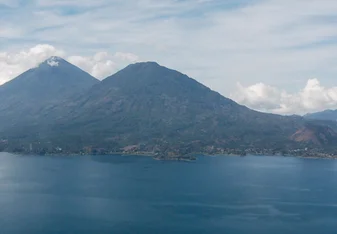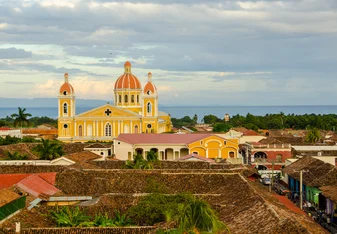TEFL Courses in Panama
About
Panama may be a sliver of land on the map, but its role in world commerce is felt throughout the world. Home to the famous Panama Canal, a miraculous engineering project completed in 1914, this country is also jam-packed with opportunities for adventure and learning. Hear the screech of howler monkeys through the rustling trees of the rainforest, or experience a different kind of jungle while riding a diablo rojo, a repurposed U.S. school bus, through the gridlock of the capital’s traffic jams.
From the international capital Panama City to coffee plantations of Boquete, Panama is a country diverse in landscapes, environments and peoples -- with plenty of English teaching jobs to satisfy the language needs of the international business industry.
Earning your TEFL degree in Panama will not only give you thrills of a lifetime, but also serve as a jumping-off point to secure a successful English teaching job and future travels in Latin America.
Course Types
In Panama, you’ll have the opportunity to earn you TEFL degree from an accredited or awaiting accreditation institution. On-site courses offer between 120-150 in-class hours and around 20 practicum hours.
TEFL Certification
The primary type of TEFL course you can take in Panama is the traditional TEFL certification (as opposed to other styles of certification). These TEFL courses will teach methodology, English linguistics background, and fundamentals of classroom management to give you the tools to become a top candidate. They may also assist in job placement by helping you locate English academies and private clients.
Planning Your Trip
When to Take Your TEFL in Panama
Plan to take your TEFL course during Panama’s summer, or dry season, November through February, or during part of the wet season July and August. Some language schools offer these four-week courses nearly all year round, but keep in mind the biggest hiring season is February/March and July/August.
Popular Destinations For TEFL Courses in Panama
The two most population destinations in Panama for TEFL courses are the sprawling, cosmopolitan capital, Panama City, and the relaxed beach town and popular tourist destination Bocas del Toro. As the governmental, tourism and business center, Panama City will ultimately give TEFL graduates more opportunity, Bocas del Toro is a surfing destination to suite those who prefer small towns and a tight-knit communities.
What to Look For in a TEFL Course in Panama
First and foremost, make sure it includes at 120-150 hour of classroom instruction and 10-20 practicum hours. Consider the experience you want in Panama, as this will also be a cultural immersion for you aside from giving you the fundamentals of teaching English. Are there field trips or language instruction, either for an additional fee or already included in the cost? Will the program arrange for homestays, or do you prefer to live with young professionals or other expats?
Also consider accreditation. Are you planning to teach in other countries in the world? Make sure you’re earning a degree from an accredited institution.
Health & Safety
Compared to its other Central American neighbors, Panama has a reputation for being a very safe country for visitors.
In Panama City, standard precautions should be taken to avoid pickpockets, robbery and assault. Police frequently patrol Casco Viejo, Old Town, but still be aware of your surroundings and avoid areas known for high crime, especially at night. Taking Ubers and instead of hailing a taxi can help avoid robbery scams and that occur once and a while.
Outside of Panama City, areas in Darién, near the border with Colombia, are said to house guerilla fighters and paramilitary groups and should be avoided.
Drinking water is safe in nearly every corner of the country, and although Panama has a squeaky-clean record when it comes to infectious diseases, students planning to travel outside Panama City should be sure to have vaccinations like typhoid, yellow fever, and Hepatitis A and B.
In Panama, attitudes towards LGBTQ are slowly becoming more accepting, but be aware that in a country with a strong Catholic legacy there are still some prejudices. Women should also be prepared to experience catcalling or street harassment, and it’s generally agreed the best solution is to ignore the perpetrator, but seek authorities if it becomes serious.
Post-TEFL Tips
Qualifications for Teaching Jobs in Panama
The qualifications required to teach English in Panama vary greatly depending on the type of education setting you aim to work in. English teachers do not need to have a bachelor’s degree to teach in Panama, though it can be advantageous if you hope to teach in private schools. In most cases, public schools and language academies require that all English teachers have a high school diploma and TEFL certification.
When To Apply For Jobs in Panama
Peak hiring months in Panama follow the South American calendar, which means most teachers find jobs before the school year in February/March and after the first semester in July/August. However, like the rest of Latin America, English teaching jobs have high turnover rates and there is the possibility to be hired at any point in the year.
Private students can also be found year round, which can provide novice teachers with a good opportunity to improve teaching skills, earn a small income, and work up to larger teaching opportunities.
Average Salary of Post-TEFL Jobs in Panama
Compared to the rest of the region, English teachers in Panama make higher wages averaging between $900-1,500 a month. However, it’s important to note that the cost of living is much higher, especially in Panama City. It can be hard to break even, let alone save. To put it in perspective, as human rights activist France Francois recently highlighted, in a country where the average salary is $600 a month, there are apartments going for $1 million.
Tips For Finding a Job in Panama
Like other countries in Latin America, finding teaching jobs in Panama is best done face-to-face, although some students reported success by emailing school before arrival. Approach English academies and consultancy firms with your resume in person. Take advice from your TEFL academy, and tap into any Facebook or online groups for expats, who may be able to point you in the right direction. In Panama City especially, the expat community may have strong business ties.












